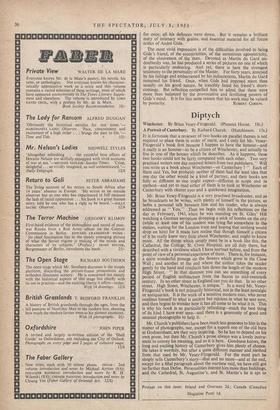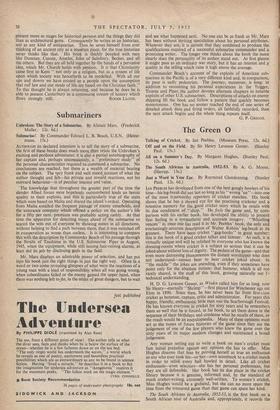Diptych IT is fortunate that a reviewer of two books
on parallel themes is not required to place them in order of merit, and I only list Mr. Vesey- Fitzgerald's book first because I happen to have the honour—and it really is an honour—to be a citizen of Winchester, and actually to live in one of the houses which he describes. As it happens, these two books could not be fairly compared with each other. Two very practised writers one day received letters from two publishers, " Will you write us a book about Winchester—or Canterbury ? " Each of them said Yes, but probably neither of them had the least idea that one day the other would be a kind of partner, and their books are fully as different as one might expect—different in scope and in method—and yet to read either of them is to look at Winchester or Canterbury with clearer eyes and a quickened imagination.
13 Mr. Brian Vesey-Fitzgerald is a very practised broadcaster, and as he broadcasts so he writes, with plenty of himself in the picture, as befits a personal talk between him and his reader, who is always addressed as " You." Thus we begin with his reflections on the day in February, 1943, when he was standing on St. Giles' Hill watching a German aeroplane dropping a stick of bombs on the city (while at least one of his readers was lying flat somewhere in the station, waiting for the London train and hoping that nothing would drop on him) for it made him realise that though himself a citizen of it he really knew very little about Winchester, and ought to know more. All the things which simply must be in a book like this, the Cathedral, the College, St. Cross Hospital, are all duly there, but described with a vividness which I have not'met before, and from the point of view of a personal experience of them. There is, for instance, a quite wonderful passage on the flowers which grow in the Close Wall ; and another at the end where the author takes the reader gently by the hand and conducts him down the length of the modern High Street. " In that distance you can see something of every period of English architecture from the Saxon to mid-twentieth century. In no other street in England can you do that. In no other street. High Street, Winchester, is unique." In a word Mr. Vesey- Fitzgerald's book is not primarily historical, not in the least nostalgic or antiquarian. It is the work of a sensitive modem man, who never confines himself to what is ancient but rejoices in what he sees now, and then begins to wonder how it has all come to be what it is. This is why his book is so particularly refreshing—much the best thing of its kind I have ever seen—and there is a generosity of good and unusual photographs to help it. ` Mr. Church's publishers have been much less generous to him in the 13 matter of photographs, nor, except for a superb one of the old barn at Godmersham, are they very inspiring. So he has to depend on his own prose, but then Mr. Church's prose always was a lovely instru- ment to convey his meaning, and so it is here. Goodness knows, the long and exciting history of Canterbury gives him plenty of chance. 13 He takes it worthily, but after a quite different manner and method from that used by Mr. Vesey-Fitzgerald. For the most part he simply tells Canterbury's story—that and no more—and at the end, except for a final paragraph about the wartime raid, we have still got 13 no further than Defoe. Personalities interest him more than buildings, and the Cathedral, St. Augustine's, and St. Martin's he is apt to present more as stages for historical persons and the things they did than as architectural gems. Consequently-he writes as an historian, not as any kind of antiquarian. Thus he saves himself from ever thinking of an ancient city as a museum piece, for the true historian never thinks like that. His book is thickly peopled with men like Dunstan, Canute, Anse1m; John of Salisbury, Becket, and all the others. But they are all held together by the bands of a pervasive idea, which Mr. Church holds with passion. It is that Christianity came first to Kent " not only as a religion, but as a system of life upon which society was henceforth to be modelled. With all our ups and downs we have existed as a people upon the assumption that our. law and our mode of life are based on the Christian faith." To this thought he is always returning, and because he does he is able to present Canterbury as a continuing stream of history which



























































 Previous page
Previous page